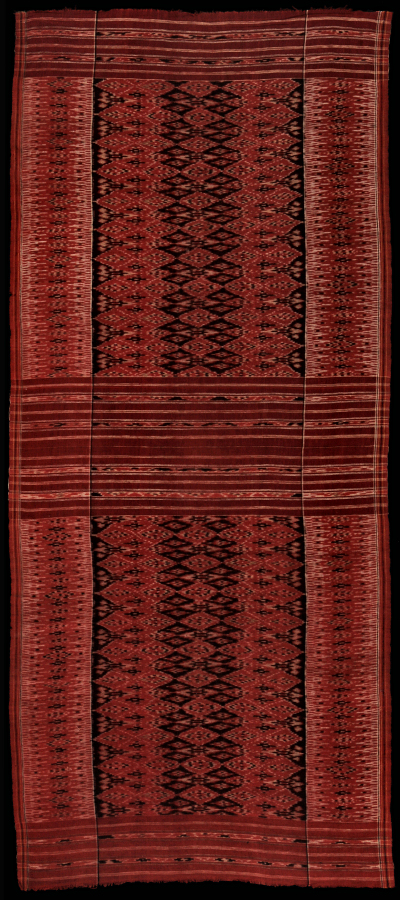| |
 
 | | | |
043 Bali Group, Nusa Penida
Kain cepuk  
| | Locale: | Village unknown. | | Period: | Early 20th c. | | Yarn: | Cotton, hand-spun, fine | | Technique: | Weft ikat | | Panels: | 1 | | Size: | 82 x 192 cm (2' 8" x 6' 3") LW: 2.34 | | Design: | Not one long, but two short kamben cepuk, still uncut after weaving. Patola-inspired design of the type named kamben cepuk padma. Predominantly white on red, with accents in dark russet and faded yellow. | | Comment: | Beautiful and old example of 'Balinese' cotton ikat kamben cepuk made on Nusa Penida, an island off aouthern coast of Bali. Brighter in tone than most Nusa Penida cloths. Immaculate condition. A true pusaka (heirloom): kamben cepuk are never worn, only used for display in ceremonies, and passed on from generation to generation. Kamben cepuk in uncut condition is extremely rare, the only other currently known examples being the one in Indonesische Textilien, Wege zu Goettern und Ahnen mentioned below and our PC 129. | | Background: | Chapters on Bali Group and Nusa Penida. | | Exhibited: | Museu do Oriente, Lisbon, 2014/15 | | Published: | Woven Languages, 2014.
Ikat Textiles of the Indonesian Archipelago, 2018.
| | Compare: | 046 124 129 | | Sources: | Basic structure conforms to that of Nusa Penida as shown in Gittinger's To Speak with Cloth, Fig. 14 on p. 188. See also Gittinger, Splendid Symbols, Fig. 106; Khan Majlis,Indonesische Textilien, Wege zu Goettern und Ahnen, Fig. 323 and p.73; Buehler, Patola Influences, Plate 14; Gillow, Traditional Indonesian Textiles, Fig. 73. Similar double kamben in British Museum, AS1984,13.21. | | |

©Peter ten Hoopen, 2025
All rights reserved.
|
|


